六年级英语下册课件 unit2 lesson13(2)(冀教版)
文档属性
| 名称 | 六年级英语下册课件 unit2 lesson13(2)(冀教版) |
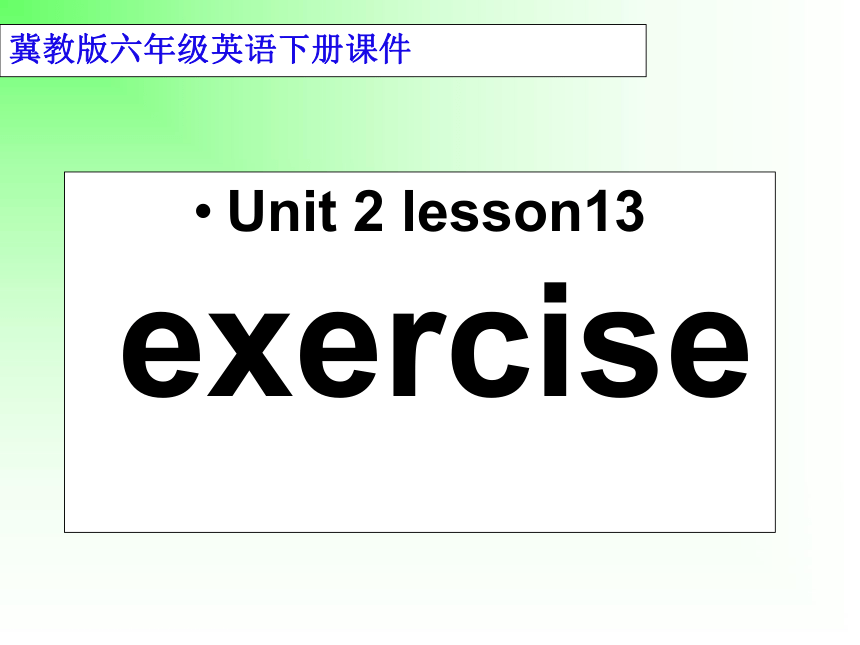
|
|
| 格式 | rar | ||
| 文件大小 | 2.7MB | ||
| 资源类型 | 教案 | ||
| 版本资源 | 冀教版 | ||
| 科目 | 英语 | ||
| 更新时间 | 2010-03-08 00:00:00 | ||
图片预览

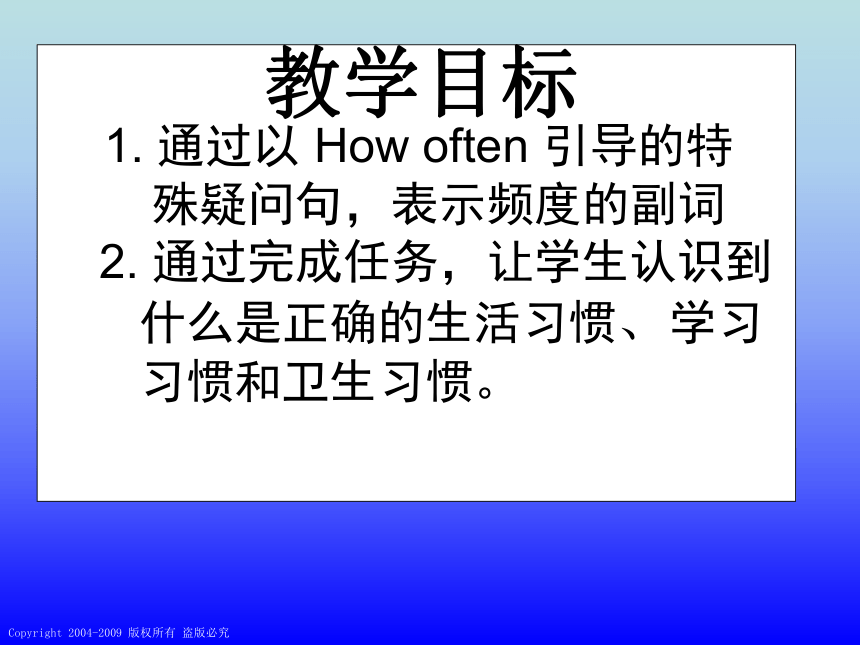
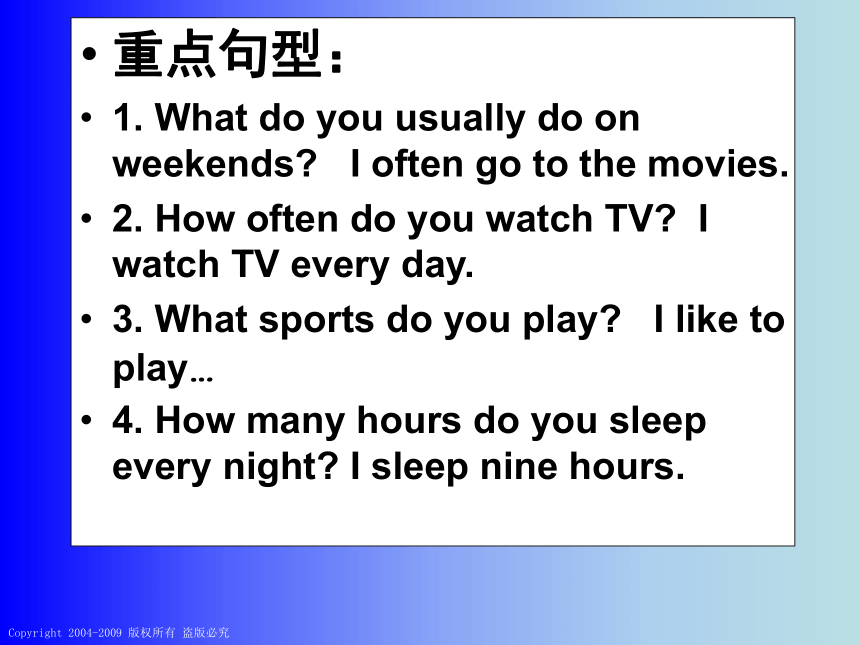

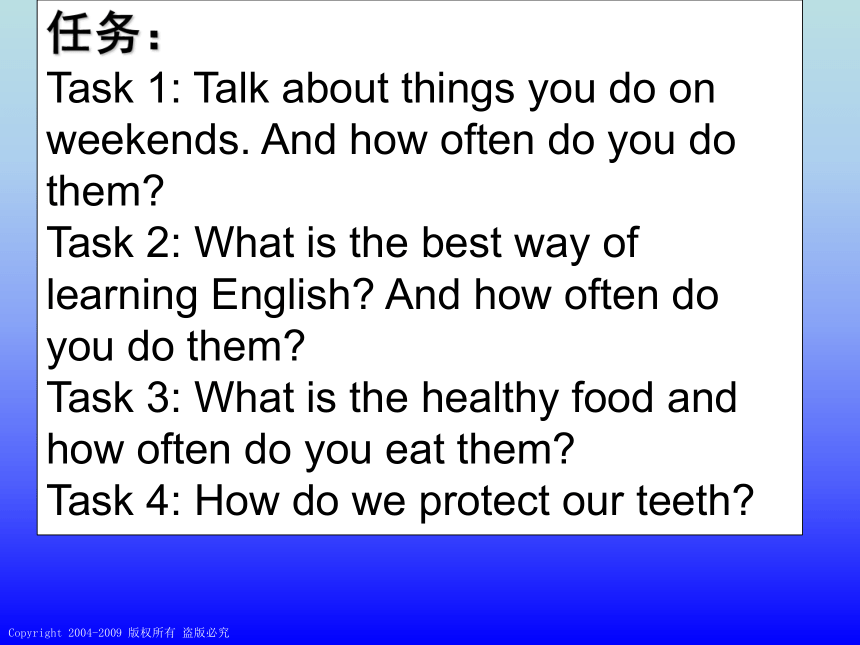
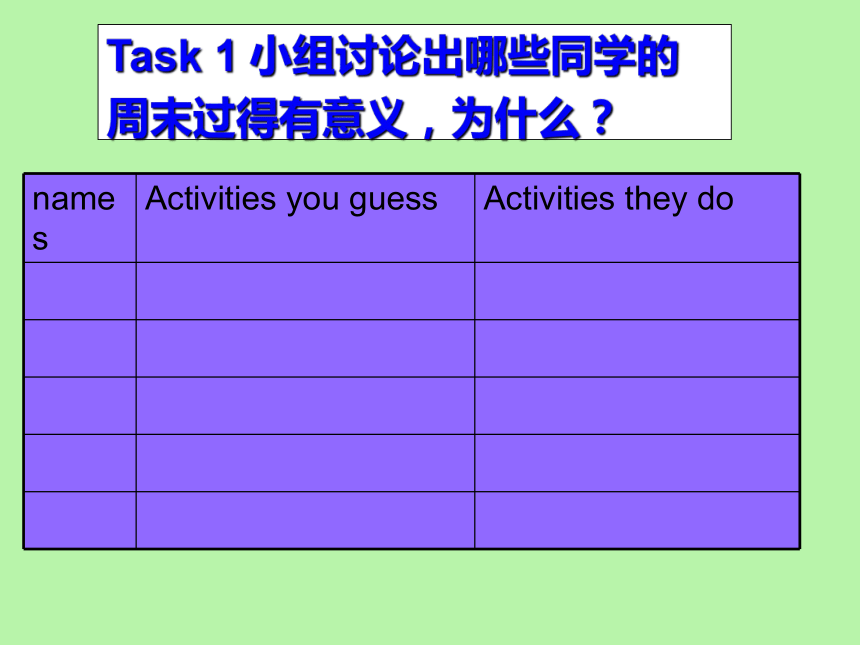
文档简介
课件13张PPT。冀教版六年级英语下册课件Unit 2 lesson13
exercise
1. 通过以 How often 引导的特
殊疑问句,表示频度的副词
2. 通过完成任务,让学生认识到
什么是正确的生活习惯、学习
习惯和卫生习惯。教学目标
重点句型:
1. What do you usually do on weekends? I often go to the movies.
2. How often do you watch TV? I watch TV every day.
3. What sports do you play? I like to play…
4. How many hours do you sleep every night? I sleep nine hours. 重点词汇:
Exercise (V), always, usually, often, sometimes, hardly ever, never how often, twice a week, once a week, times, surf the internet, shop (v), all, most, result, activity, survey, improve, translate, junk food, fruit, milk, sleep, vegetable, health, healthy, pretty, eating habit, try, a lot of, of course, look after, grade, difference, more, unhealthy, yuck, maybe, although, skateboarding任务: Task 1: Talk about things you do on weekends. And how often do you do them? Task 2: What is the best way of learning English? And how often do you do them? Task 3: What is the healthy food and how often do you eat them? Task 4: How do we protect our teeth?Task 1 小组讨论出哪些同学的
周末过得有意义,为什么?Task 2 课外活动的频度到底多少是合理的?
(每组共四人)Task 3 怎样才能提高你的英语成绩
此项活动的目的是将所学的知识在实际交流中能马上熟练运用。Who’s the best English student?Task 4. 如何正确的清洁牙齿
1. How often do you brush your teeth?2. How long do you brush your teeth?
3. What type of tooth-brush do you use?
4. Do you use toothpaste with fluorine?
5. How often do you eat sweets?
6. How often do you see your dentist for a preventive check-up?
7. How often do you change your toothbrush?Fruits rice cookies vegetables candies fish potatoes soup egg tofu breadHow often do you eat_______?调查问卷设计四、疑点、难点解析
1. 频率副词的位置:总的来说,频度副词的位置比较灵活。一般情况下,肯定句中,频度副词放在句子中间,否定据中放在句子中间,但是有的也可以放在句末或句首。
2. junk food指的是没有营养的垃圾食品。
3.在Section B中,有两个句子应该解释一下:
1)But my mother wants me to drink it.
want sb. to do sth.
2) She says it’s good for my health.
It’s good for 那对…有好处单词线标alwaysalmost alwaysusuallyoftenfrequentlyquite oftensometimesoccasionallyrarelyseldomnever用来展示同类单词的语意差别的一种方式.
运用脑激励提供单词, 学生排列.Goodbye
1. What do you usually do on weekends? I often go to the movies.
2. How often do you watch TV? I watch TV every day.
3. What sports do you play? I like to play…
4. How many hours do you sleep every night? I sleep nine hours. 重点词汇:
Exercise (V), always, usually, often, sometimes, hardly ever, never how often, twice a week, once a week, times, surf the internet, shop (v), all, most, result, activity, survey, improve, translate, junk food, fruit, milk, sleep, vegetable, health, healthy, pretty, eating habit, try, a lot of, of course, look after, grade, difference, more, unhealthy, yuck, maybe, although, skateboarding任务: Task 1: Talk about things you do on weekends. And how often do you do them? Task 2: What is the best way of learning English? And how often do you do them? Task 3: What is the healthy food and how often do you eat them? Task 4: How do we protect our teeth?Task 1 小组讨论出哪些同学的
周末过得有意义,为什么?Task 2 课外活动的频度到底多少是合理的?
(每组共四人)Task 3 怎样才能提高你的英语成绩
此项活动的目的是将所学的知识在实际交流中能马上熟练运用。Who’s the best English student?Task 4. 如何正确的清洁牙齿
1. How often do you brush your teeth?2. How long do you brush your teeth?
3. What type of tooth-brush do you use?
4. Do you use toothpaste with fluorine?
5. How often do you eat sweets?
6. How often do you see your dentist for a preventive check-up?
7. How often do you change your toothbrush?Fruits rice cookies vegetables candies fish potatoes soup egg tofu breadHow often do you eat_______?调查问卷设计四、疑点、难点解析
1. 频率副词的位置:总的来说,频度副词的位置比较灵活。一般情况下,肯定句中,频度副词放在句子中间,否定据中放在句子中间,但是有的也可以放在句末或句首。
2. junk food指的是没有营养的垃圾食品。
3.在Section B中,有两个句子应该解释一下:
1)But my mother wants me to drink it.
want sb. to do sth.
2) She says it’s good for my health.
It’s good for 那对…有好处单词线标alwaysalmost alwaysusuallyoftenfrequentlyquite oftensometimesoccasionallyrarelyseldomnever用来展示同类单词的语意差别的一种方式.
运用脑激励提供单词, 学生排列.Goodbye
同课章节目录
- Unit 1 Sports
- Lesson 1 Ping-pong and basketball
- Lesson 2 At the sports Shop
- Lesson 3 Let's Play!
- Lesson 4 Did You Have Fun?
- Lesson 5 A Basketball Game
- Lesson 6 A Famous Football Playe
- Again, please!
- Unit 2 Good Health to You!
- Lesson 7 Always Have breakfast!
- Lesson 8 Always Brush Your Teeth!
- Lesson 9 Eat More Vegetables and Fruit!
- Lesson 10 Exercise
- Lesson 11 Work hard!
- Lesson 12 Helen Kelle
- Again, please!
- Unit 3 What Will You Do This Summer?
- Lesson 13 Summer is coming!
- Lesson 14 Tomorrow We Will Play
- Lesson 15 Jenny's Summer Holiday
- Lesson 16 Li Ming's Summer Holiday
- Lesson 17 Danny's Summer Holiday
- Lesson 18 Three Kites in the Sky
- Again, please!
- Unit 4 Li Ming Comes Home
- Lesson 19 Buying Gifts
- Lesson 20 Looking at Photos
- Lesson 21 A party for Li Ming
- Lesson 22 Surprise!
- Lesson 23 Good-bye!
- Lesson 24 Danny's Surprise Cake
- Again, please!
